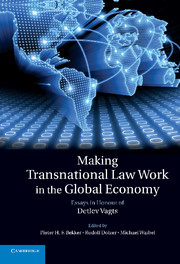Book contents
- Frontmatter
- Contents
- List of contributors
- Foreword: the transnationalism of Detlev Vagts
- List of cases cited
- List of abbreviations and acronyms
- Introduction: a Festschrift to celebrate Detlev Vagts' contributions to transnational law
- 1 Detlev Vagts and the Harvard Law School
- 2 Constructing and developing transnational law: the contribution of Detlev Vagts
- I International law in general
- 3 ‘Hegemonic international law’ in retrospect
- 4 Textual interpretation and (international) law reading: the myth of (in)determinacy and the genealogy of meaning
- 5 The changing role of the State in the globalising world economy
- 6 Sources of human rights obligations binding the UN Security Council
- 7 Is transnational law eclipsing international law?
- 8 Participation in the World Trade Organization and foreign direct investment: national or European Union competences
- 9 From dualism to pluralism: the relationship between international law, European law and domestic law
- 10 Transnational law comprises constitutional, administrative, criminal and quasi-private law
- 11 Founding myths, international law, and voting rights in the District of Columbia
- 12 The tormented relationship between international law and EU law
- 13 International law scholarship in times of dictatorship and democracy: exemplified by the life and work of Wilhelm Wengler
- II Transnational economic law
- III Transnational lawyering and dispute resolution
- Bibliography of Detlev Vagts
- Index
11 - Founding myths, international law, and voting rights in the District of Columbia
from I - International law in general
Published online by Cambridge University Press: 17 November 2010
- Frontmatter
- Contents
- List of contributors
- Foreword: the transnationalism of Detlev Vagts
- List of cases cited
- List of abbreviations and acronyms
- Introduction: a Festschrift to celebrate Detlev Vagts' contributions to transnational law
- 1 Detlev Vagts and the Harvard Law School
- 2 Constructing and developing transnational law: the contribution of Detlev Vagts
- I International law in general
- 3 ‘Hegemonic international law’ in retrospect
- 4 Textual interpretation and (international) law reading: the myth of (in)determinacy and the genealogy of meaning
- 5 The changing role of the State in the globalising world economy
- 6 Sources of human rights obligations binding the UN Security Council
- 7 Is transnational law eclipsing international law?
- 8 Participation in the World Trade Organization and foreign direct investment: national or European Union competences
- 9 From dualism to pluralism: the relationship between international law, European law and domestic law
- 10 Transnational law comprises constitutional, administrative, criminal and quasi-private law
- 11 Founding myths, international law, and voting rights in the District of Columbia
- 12 The tormented relationship between international law and EU law
- 13 International law scholarship in times of dictatorship and democracy: exemplified by the life and work of Wilhelm Wengler
- II Transnational economic law
- III Transnational lawyering and dispute resolution
- Bibliography of Detlev Vagts
- Index
Summary
Introduction
The idea of a self-governing people lies at the heart of the American experience. It is deeply enshrined in the justification to the world for the abrupt breach, bloody indeed, with the British Empire. “Taxation without representation” is more than a bumper sticker or an inscription on a Washington license plate. It is the basis for the claim in the founding document of the United States, the Declaration of Independence, for secession, the centerpiece of the nascent country's case to a “candid world” against King George III's “injuries and usurpations,” including the rationale “for imposing Taxes on us without our Consent.” As Thomas Jefferson penned, in his perennial prose, “[t]o secure these [unalienable] rights [among them Life, Liberty, and the pursuit of Happiness], Governments are instituted among Man, deriving their just powers from the consent of the governed.”
This was indeed a revolutionary statement, foreshadowed, in the American context, only by philosophers of natural rights and the Enlightenment movement in England and France and the colonies themselves.
Surprisingly, though, the denial of statehood for the District of Columbia (DC) and the effective exclusion of its residents, citizens of the United States, from participating in the election of the legislative structures and functions of the Federal government has left a gaping hole in the implementation of the benefits promised by this original document – not unlike the equally great promise of an equally unalienable right, i.e., that “all men are created equal.
- Type
- Chapter
- Information
- Making Transnational Law Work in the Global EconomyEssays in Honour of Detlev Vagts, pp. 174 - 197Publisher: Cambridge University PressPrint publication year: 2010



